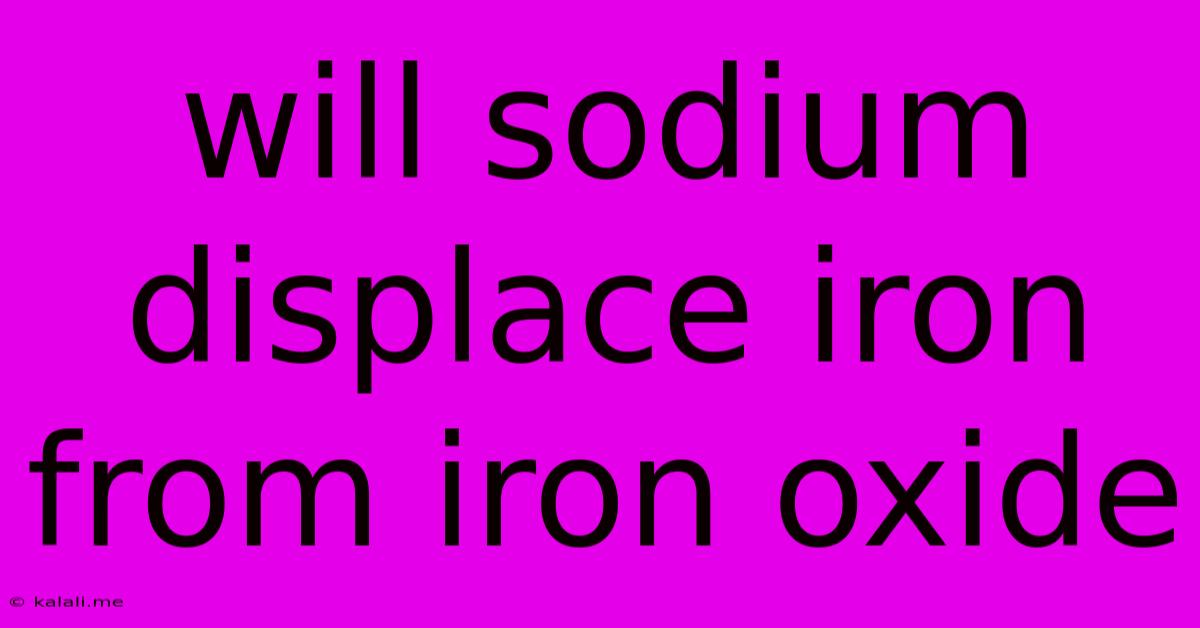Will Sodium Displace Iron From Iron Oxide
Kalali
May 19, 2025 · 3 min read

Table of Contents
Will Sodium Displace Iron from Iron Oxide? Exploring the Reactivity of Alkali Metals
This article explores the fascinating reaction between sodium (Na) and iron oxide (Fe₂O₃), specifically investigating whether sodium can displace iron from its oxide. We'll delve into the underlying principles of reactivity, examining the electrochemical series and the thermodynamics of the reaction. Understanding this reaction provides insight into the properties of alkali metals and their applications in various chemical processes.
Understanding Reactivity and the Electrochemical Series
The ability of sodium to displace iron from iron oxide hinges on its relative reactivity. The electrochemical series, a table ranking elements based on their standard reduction potentials, is crucial for predicting the outcome of redox (reduction-oxidation) reactions. Elements higher in the series are more likely to lose electrons (oxidize) and displace elements lower in the series.
Sodium (Na) sits significantly higher than iron (Fe) in the electrochemical series. This means sodium has a much stronger tendency to lose electrons and become a positive ion (Na⁺). This inherent property is the driving force behind the potential displacement reaction.
The Thermodynamics of the Reaction
While the electrochemical series indicates the potential for a reaction, thermodynamics determines its feasibility. We need to consider the Gibbs Free Energy (ΔG) change of the reaction. A negative ΔG indicates a spontaneous reaction, meaning it will proceed without external input of energy. The enthalpy change (ΔH) and entropy change (ΔS) contribute to the overall ΔG.
The reaction between sodium and iron oxide is exothermic (ΔH < 0), meaning it releases heat. The increased disorder (increased entropy, ΔS > 0) further contributes to a negative ΔG. Therefore, thermodynamically, the displacement of iron by sodium from iron oxide is favorable.
The Reaction Equation and its Implications
The balanced chemical equation for the reaction is:
6Na + Fe₂O₃ → 3Na₂O + 2Fe
This equation shows that sodium reacts vigorously with iron oxide, producing sodium oxide (Na₂O) and elemental iron (Fe). The reaction is highly exothermic, often producing a significant amount of heat and light. The intensity of the reaction depends on factors like the surface area of the iron oxide, purity of the reactants, and temperature.
Practical Considerations and Applications
The displacement reaction between sodium and iron oxide is rarely used in industrial settings due to the high reactivity of sodium. Sodium's intense reactivity with water and air necessitates careful handling and specialized equipment. However, understanding this principle has applications in other fields. The high reactivity of alkali metals forms the basis of many reduction processes in the chemical industry, even if not specifically involving iron oxide displacement. The understanding of this reactivity is crucial in material science, particularly in developing new alloys and composites.
Conclusion:
Yes, sodium will displace iron from iron oxide. This is due to its higher reactivity and the favorable thermodynamics of the reaction. While the reaction is not commonly used industrially due to safety concerns surrounding sodium's high reactivity, understanding this reaction provides valuable insights into the chemical behavior of alkali metals and their applications in various scientific and engineering disciplines. Further research into the reaction kinetics and optimizing reaction conditions can provide a deeper understanding of this dynamic redox reaction.
Latest Posts
Latest Posts
-
Where Did The Red Brick Road Go
May 19, 2025
-
Suffer Not The Witch To Live
May 19, 2025
-
Email Address Capital Letters Does Matter
May 19, 2025
-
Can You Mix Antifreeze And Water
May 19, 2025
-
Many A Slip Between Cup And Lip
May 19, 2025
Related Post
Thank you for visiting our website which covers about Will Sodium Displace Iron From Iron Oxide . We hope the information provided has been useful to you. Feel free to contact us if you have any questions or need further assistance. See you next time and don't miss to bookmark.